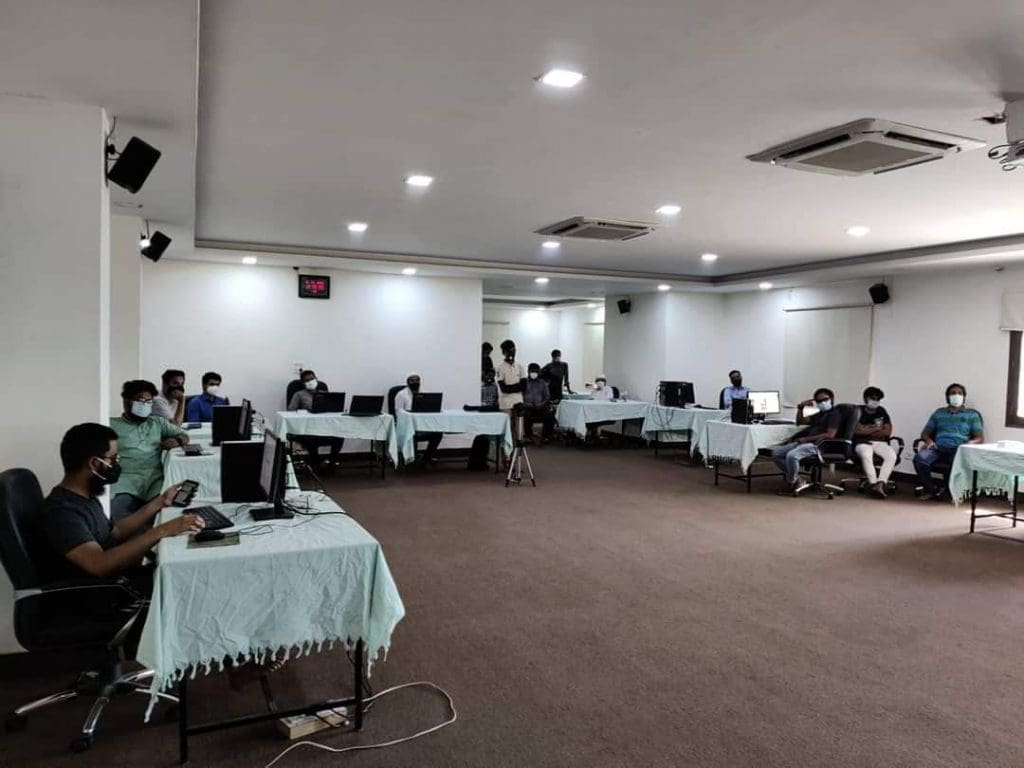
As a massive surge of Covid-19 cases has been wreaking havoc on the country causing an unprecedented health crisis, Student Islamic Organisation (SIO) is one of those groups which came forward to play their role in the fight against coronavirus by helping the patients and distressed people.
On 25 April, SIO in collaboration with Jamaat-e-Islami Hind (JIH) set up a Covid Relief Task Force at the headquarters of JIH located in Delhi’s Jamia Nagar. The Task Force has set its aim to map resources and accurately guide the patients to them. According to SIO leaders, the Task Force has been set up at the national level with SIO and Jamaat units in almost all states doing the relief works. There are 1000 volunteers who are working across the country under the SIO’s Task fForce.
SIO National Secretary Musab Qazi told Maktoob that in the last two weeks since the Task Force has been set up, they have received around 12000 requests for oxygen, beds, plasma and medicines like Remdesvir. Of those requests, they could map resources for more than half of them.
Explaining how they could set up the system of helping the patients, Qazi said “When we started, we had issued two helpline numbers and suggested a hashtag #SIOSOS for social media from where we would take requests. Since then we kept receiving calls mainly for four things – beds, oxygen, plasma and medicines. We had set up the system that some people were receiving calls from the helpline numbers and put the information of the requirements into the google sheet form. There was another team which brought out the information according to the requirements of the patients and gave them”.
After a few days into the work of mapping resources, the Delhi team of the Task Force started receiving calls from across India. Then, SIO formed a team of volunteers at the district and state level for gathering verified leads from those areas and sending them to the national team. Based on the inputs received from the local team, the national team provides information to the patients of that area. This is how different areas and states such as Telegana, Jabalpur in Madhya Pradesh, Gujarat, some districts in Maharashtra and West Bengal have developed their parallel system for providing verified information to the patients about the resources.
Quazi said that his team is receiving the request the most for oxygen, then beds and then plasama and then medicines. Over 40% of the requests received are for Oxygen, around 30% are for hospital beds and more than 20% callers sought plasma donations. The remaining requests pertained to medicines such as Remdesivir and Tozilizumab.
Most of the calls come from Delhi and then Uttar Pradesh and then Telangana. Around 40% of the callers hailed from Delhi, followed by 20% and 14% requests from Uttar Pradesh and Telangana, respectively.
“As far as the availability of the resources is concerned, we face difficulties to find resources in Delhi and UP where there is acute shortage of them. But in other places, we somehow find the resources. We were not able to assist people in case of plasma. We called for plasma donors’ help and gathered a list of 100 people from the network of SIO-Jamaat who recovered from covid-19. We are trying to help people through that,” said Qazi.
The task force team gathers information about the resources through two ways: one is publicly available information about them which they try to verify and the second is the network of SIO-Jamaat.
National President of SIO Salman Ahmad says that the thought of helping covid patients came to their mind when they were thinking about their response to this pandemic according to the teachings of Prophet Mohammed. The saying of the Prophet “The best among the people is the one who is the most beneficial for the humanity” has inspired the SIO to initiate relief work, he said.
After the thought of helping people came into mind, they consulted with the Jamaat leaders, gathered IT professionals and set up the mechanism to identify the resources.
Salman said that in order to set up the mechanism, they formed three teams: One team is for handling the central control room, another team is for those who were present on the field and third one is for those who handled online and technology works.
While helping the people, the most important thing which Salman felt is the failure of the states in providing basic healthcare facilities.
“State has completely failed in providing basic healthcare facilities. The crisis of Delhi and Uttar Pradesh is severe. This caused extreme pressure on our volunteers. Our volunteers received many such calls in which the patient died during the conversation. In many cases, when we get back to the people with verified information about beds and medicines, we come to know that the patient died. We are receiving many such calls daily. It makes a bad impact on the psychology of our volunteers,” said Salman.
As the governments are missing in action to alleviate the sufferings of patients, groups like SIO, professional NGOs and philanthropist individuals have come forward to help people in their limited capacity. India continues to report over 4 lakh cases and over 4,000 deaths every day. Experts believe that the official data about covid cases and deaths are underestimated. The real situation of the covid crisis is far more severe than the official numbers. States like Uttar Pradesh, Gujarat and Madhya Pradesh have been accused of underreporting covid deaths.



